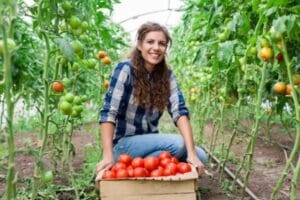So You Want to Be a Farmer: Consider a Farm Apprenticeship

What do you want to be when you grow up? Some people have an answer for this question when they’re five, but for most of us it takes longer to figure out. If your answer to this question is, “I want to be a farmer,” then check out a farm apprenticeship.
What is a farm apprenticeship?
A farm apprenticeship is similar to an internship. It is an opportunity for you to have a hands-on, practical education in the day-to-day workings of a farm. In many cases you live at the farm (or nearby), take part in all farm operations, and earn a stipend. Apprenticeships can last from a few weeks to many months.
Why is it helpful?
Because of the hands-on nature of the farm apprenticeship, you’ll get a true sense of whether life as a farmer is for you. You’ll see what a farmer’s hours is like, what type of work occupies their days, and how they tackle challenges. It is a good opportunity to learn if the smell of cow manure nauseates you (in which case you probably don’t want to become a dairy farmer) or if rising with the sun is simply too early for you to be a fully-functioning human. It is also a time to nurture a passion for growing your own food, connect with the land, and work hard with other dedicated like-minded folks.
Being an apprentice is also a good way to network and gain contacts in the farming community. As an apprentice you’ll meet other farmers and learn what organizations exist in the state to support farmers. These contacts will be invaluable to you if you decide to continue your career as a farmer.
Who should consider?
Farmers who offer apprenticeships are not simply looking for cheap labor. Most are truly committed to fostering the next generation of farmers and, therefore, they look for candidates who are dedicated, curious, and committed to making the most of their time as an apprentice.
When can you apprentice?
When you will apprentice depends on where you apprentice. If you’re working on a farm with a year-round growing season then you could be an apprentice at any time of year, but in regions with a specific growing season (i.e. spring, summer, fall) then chances are that you won’t be an apprentice during the winter months.
Where can you apprentice?
Select farms in all 50 states–as well as some abroad–offer apprenticeships. Think about what type of farm will be a good fit for you. Do you want to work on an organic or sustainable farm? A family farm or one that is owned by a corporation? A farm that only grows vegetables or one that also raises livestock? A farm that is close to home or farther away? The more time you spend making an informed choice, the better the chance that you’ll have a positive experience.
How do you find an apprenticeship?
Your state will have an organization for supporting farmers. Many of their web sites will list educational opportunities. Examples include: Northeast Organic Farming Association of New York, Minnesota Food Association, Florida Organic Growers, and Maine Organic Farmers and Gardeners Association.
Also, BeginningFarmers.org, ATTRA Sustainable Agriculture, and Biodynamic Association, have extensive listings of apprenticeship opportunities.
Do you have a farm near you? Contact them to see if they offer a farm apprenticeship program.
What about becoming a journeyperson or an intern?
An apprenticeship is an entry-level position; a journeyperson has more training and can therefore work more independently. One is often an apprentice before becoming a journeyperson.
The Maine Organic Farmers and Gardeners Association describes its journeyperson program this way: “The program is designed to fill the continuing education gap between apprentice and independent farmer, and to provide the resources and opportunities for prospective new farmers who have completed an apprenticeship or have farmed for at least 2 years to further develop the skills they need to farm independently and successfully.”
Although more the exception than the rule, some farms offer internships which are an even more entry-level position than an apprenticeship. These farms may require that applicants complete an internship before applying for an apprenticeship.
Whether you become an intern, apprentice, or journeyperson, your time on the farm is sure to be educational, fulfilling, and show you a side of food production that most consumers miss out on.
Related on Organic Authority
Viva Farms Helps Budding Farmers Grow
Underwood Farms: Why Sustainable Farming Was the Right Choice
The New Faces of the American Family Farm: Sisters
photo of farmer with tomatoes via Shutterstock

